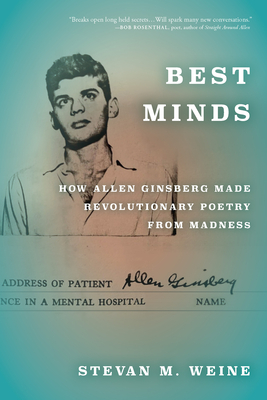Best Minds: How Allen Ginsberg Made Revolutionary Poetry from Madness

Best Minds: How Allen Ginsberg Made Revolutionary Poetry from Madness
A revelatory look at how poet Allen Ginsberg transformed experiences of mental illness and madness into some of the most powerful and widely read poems of the twentieth century.
Allen Ginsberg's 1956 poem "Howl" opens with one of the most resonant phrases in modern poetry: "I saw the best minds of my generation destroyed by madness." Thirty years later, Ginsberg entrusted a Columbia University medical student with materials not shared with anyone else, including psychiatric records that documented how he and his mother, Naomi Ginsberg, struggled with mental illness. In Best Minds, psychiatrist, researcher, and scholar Stevan M. Weine, M.D., who was that medical student, examines how Allen Ginsberg took his visions and psychiatric hospitalization, his mother's devastating illness, confinement, and lobotomy, and the social upheavals of the postwar world and imaginatively transformed them. Though madness is often linked with hardship and suffering, Ginsberg's showed how it could also lead to profound and redemptive aesthetic, spiritual, and social changes. Through his revo-lutionary poetry and social advocacy, Ginsberg dedicated himself to leading others toward new ways of being human and easing pain.Throughout his celebrated career Ginsberg made us feel as though we knew everything there was to know about him. However, much has been left out about his experiences growing up with a mentally ill mother, his visions, and his psychiatric hospitalization. In Best Minds, with a forty-year career studying and addressing trauma, Weine provides a groundbreaking exploration of the poet and his creative process especially in relation to madness. Best Minds examines the complex relationships between mental illness, psychiatry, trauma, poetry, and prophecy--using the access Ginsberg generously shared to offer new, lively, and indis-pensable insights into an American icon. Weine also provides new understandings of the paternalism, treatment failures, ethical lapses, and limitations of American psychiatry in the 1940s and 1950s. In light of these new discoveries, the challenges Ginsberg faced appear starker and his achieve-ments, both as a poet and an advocate, even more remarkable.
PRP: 269.91 Lei
Acesta este Prețul Recomandat de Producător. Prețul de vânzare al produsului este afișat mai jos.
242.92Lei
242.92Lei
269.91 LeiLivrare in 2-4 saptamani
Descrierea produsului
A revelatory look at how poet Allen Ginsberg transformed experiences of mental illness and madness into some of the most powerful and widely read poems of the twentieth century.
Allen Ginsberg's 1956 poem "Howl" opens with one of the most resonant phrases in modern poetry: "I saw the best minds of my generation destroyed by madness." Thirty years later, Ginsberg entrusted a Columbia University medical student with materials not shared with anyone else, including psychiatric records that documented how he and his mother, Naomi Ginsberg, struggled with mental illness. In Best Minds, psychiatrist, researcher, and scholar Stevan M. Weine, M.D., who was that medical student, examines how Allen Ginsberg took his visions and psychiatric hospitalization, his mother's devastating illness, confinement, and lobotomy, and the social upheavals of the postwar world and imaginatively transformed them. Though madness is often linked with hardship and suffering, Ginsberg's showed how it could also lead to profound and redemptive aesthetic, spiritual, and social changes. Through his revo-lutionary poetry and social advocacy, Ginsberg dedicated himself to leading others toward new ways of being human and easing pain.Throughout his celebrated career Ginsberg made us feel as though we knew everything there was to know about him. However, much has been left out about his experiences growing up with a mentally ill mother, his visions, and his psychiatric hospitalization. In Best Minds, with a forty-year career studying and addressing trauma, Weine provides a groundbreaking exploration of the poet and his creative process especially in relation to madness. Best Minds examines the complex relationships between mental illness, psychiatry, trauma, poetry, and prophecy--using the access Ginsberg generously shared to offer new, lively, and indis-pensable insights into an American icon. Weine also provides new understandings of the paternalism, treatment failures, ethical lapses, and limitations of American psychiatry in the 1940s and 1950s. In light of these new discoveries, the challenges Ginsberg faced appear starker and his achieve-ments, both as a poet and an advocate, even more remarkable.
Detaliile produsului













